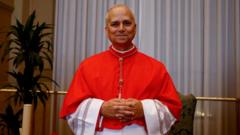Pope Leo XIV, hailing from Chicago and serving in Peru, emphasizes peace and unity in his inaugural speech, as the Catholic world reacts with both joy and contemplation.
**Pope Leo XIV: A Historic Moment for American Catholicism**

**Pope Leo XIV: A Historic Moment for American Catholicism**
In a groundbreaking election, Cardinal Robert Francis Prevost becomes the first American pope, taking the name Leo XIV, amid global anticipation.
In a momentous election held in the heart of Vatican City, Cardinal Robert Francis Prevost has been named the 267th pope of the Roman Catholic Church, taking on the title of Pope Leo XIV. This landmark moment marks a historic first, as Prevost becomes the first American to lead the nearly 1.4 billion Catholics worldwide. His elevation comes after Pope Francis's passing, igniting a conclave that lasted merely over 24 hours— the swiftest in years.
The announcement was heralded by a plume of white smoke rising from the chimney atop the Sistine Chapel, drawing cheers from thousands gathered in St. Peter's Square. A Chicago native, Prevost's first words as pontiff were heartfelt expressions calling for peace and unity: "Peace be with you." He pointedly emphasized the need for a church committed to justice and dialogue, indicating his intention to build on the inclusive legacy left by his predecessor.
Born and raised in Chicago, Prevost has spent extensive time serving in Peru, where he became deeply involved in local communities. This unique journey underscores his perspective as a global church leader, transcending boundaries formed by national identities. His influences from both the United States and Latin America could reshape the dialogue within the church, as he draws from diverse cultural experiences.
Prevost’s election has been met with mixed reactions, reflecting varied sentiments across the globe, especially in the U.S., where some see this as an opportunity for bridging divided communities. Celebrations erupted in Chicago and among many American Catholics, who viewed his ascension with pride. Meanwhile, concerns linger regarding the balance he might strike on contentious issues such as LGBTQ acceptance, given his past comments.
The conclave that led to Prevost's appointment consisted of 133 cardinals, required to navigate ideological divisions between those favoring Pope Francis’s more progressive views and others seeking a return to traditional conservatism. Prevost is seen as a moderate voice who might provide stability in these turbulent times for the church.
In his first address, Leo XIV made notable efforts to connect with the audience, switching languages to Spanish to honor Peru, his adopted homeland. While not addressing American issues directly, his global orientation bodes well for his envisaged multitiered responses to the various challenges facing the Catholic Church today.
The implications of having an American pope could resonate beyond religious contexts, affecting U.S. diplomacy and the church's role in political discourse. As reactions continue to unfold, America watches, perhaps hoping that Pope Leo XIV will usher in an era of renewed paths toward reconciliation, unity, and peace on a worldwide scale.























